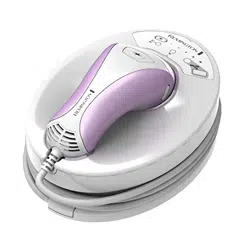Loading ...
Loading ...
Loading ...

17
discomfort as when a rubber band is
lightly snapped against the skin. If the
pain is too intense or persists after
a treatment, stop using and contact
Customer Service (page 44).
• Your skin may become red within 24
hours after treatment. This redness
generally clears up within a few hours.
See your doctor if the redness does not
go away within 2–3 days.
• Temporary blisters. These are unlikely
for people with a light or medium skin
tone. If you do develop a blister, stop
using i-Light® Pro, clean the blister
with soap or antiseptic and cover the
blister with a bandage and change
daily to help prevent the blister from
becoming infected. Contact Customer
Service on page 44 if you need more
information.
• In rare cases, some users may see an
increase in the number of hairs in the
treated area after treatment. Since hair
grows in cycles, this increase is gener-
ally temporary. If at any time after you
begin using i-Light® Pro you believe
that the number of hairs regrowing in
the treatment area is greater than the
number that existed before you started
treatment, stop using i-Light® Pro and
contact Customer Service (page 44). If
this increase persists over several treat-
ments, stop using and see your doctor.
The following symptoms affected no
participants in the clinical study, but have
been reported with other hair removal
lasers or IPL devices:
• Skin swelling, especially around the hair
follicle. If the swelling doesn’t go away
within 2–3 days, stop using and contact
Customer Service (page 44).
• Skin discoloration. If you notice that
your Skin Tone in the treatment area
has changed, stop using and contact
Customer Service (page 44).
•
Eye injury. Flashing any laser or IPL
device near or around the eyes could
cause serious and permanent eye injury.
This is very unlikely so long as the device
is used below the neck as indicated.
Benefits and Risks
Loading ...
Loading ...
Loading ...
